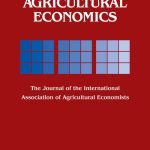Tag: Agricultural Transformation, Food Systems & Nutrition Transition

Food Systems Transformation in Asia – A Brief Economic History
Abstract Asia’s food systems have undergone rapid economic and socio-cultural transformations in the past 60 years. During the period, almost all the countries in the region eradicated famines and achieved food self-sufficiency and heterogeneous levels of poverty reduction. Food system transformation in Asian countries has...

Indian Obesity Varies by Gender, Rural/Urban Divide
This policy brief presents the findings of a TCI study examining differences in the incidence of overweight within India according to biological, technological, and environmental factors. The study shows that overweight and obesity rates are tied to such variables as gender and the level of...

To Reduce Stunting, Space Out Births
This policy brief presents the findings of a TCI study exploring the linkages between birth order, time between births, and relative height-for-age. According to the study, birth order affects height when births occur less than three years apart, with the height gap increasing between later-born...

Healthy Diets Are Too Expensive for Most Indians
This policy brief presents the findings of a TCI study assessing the cost of the EAT-Lancet diet in India. The study reveals a significant gap between current food consumption and the EAT-Lancet diet in India. The EAT-Lancet diet costs $3-5 per person per day in...

Researchers Urge Smarter Pursuit of SDGs
Policymakers seeking to achieve sustainable development goals (SDGs) like zero hunger should be mindful of how the pursuit of one goal can aid or impede progress toward others, researchers for the Tata-Cornell Institute for Agriculture and Nutrition (TCI) say in…

Food, Agriculture, and Nutrition in Bihar: Getting to Zero Hunger
TCI’s 2022 report on Food, Agriculture, and Nutrition in Bihar (FAN-Bihar) provides a detailed reassessment of the food system approach for achieving the 2nd Sustainable Development Goal (SDG2) — zero hunger by 2030 — in Bihar. The report emphasizes the high rates of malnutrition in...

TCI Director Talks Food Systems on Cornell Policy Review Podcast
TCI Director Prabhu Pingali was interviewed for an episode of the Cornell Policy Review podcast, where he discussed food systems and related issues.
Speaking with Cornell MPA student Shivanshu Sharma, Pingali spoke about the nature of food systems transformations, gender…

Essays on the Effects of Migration & Remittances on Households in Rural India
Abstract This dissertation focuses on the effects of migration and remittances on the welfare of families left-behind, in the context of farming households in rural India. Labor migration is heavily male dominant in India, and women and children are often left behind. Though internal migration...

Pakistan Can Benefit from FPOs
By promoting farmer cooperatives and farmer producer organizations (FPOs), Pakistan can help its agricultural sector meet the rising demand for food brought on by structural changes to the country’s economy, argues Tata-Cornell Institute for Agriculture and Nutrition (TCI) research support…

Local Factors Are Key to Reducing Stunting
Indian policymakers can create targeted programs that more effectively reduce stunting by accounting for regional differences in environmental factors like climate, according to new research from the Tata-Cornell Institute for Agriculture and Nutrition (TCI).
In a two-part study published in…

